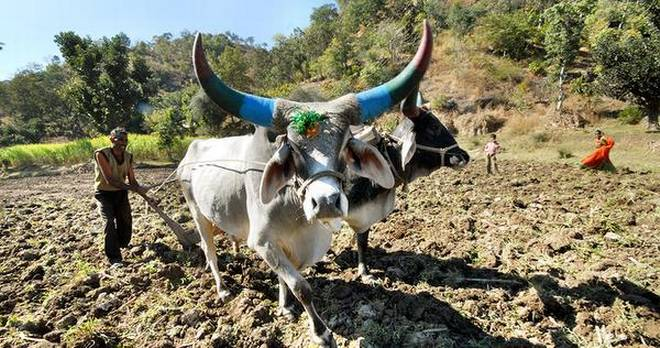Facing a difficult situation on the waiver of farmers’ debts, the Congress government in Rajasthan on Thursday stopped the auction of agricultural land belonging to farmers who failed to repay the loans obtained from commercial banks functioning under the control of Reserve Bank of India (RBI). The issue had taken a political turn after the banks started serving notices on the defaulting farmers.
Though the State government had offered to get the loans disbursed by nationalised and commercial banks waived through a one-time scheme, the banks initiated action for land attachment and auction under the Rajasthan Agricultural Credit Operations (Removal of Difficulties) Act, 1974. A large number of defaulting farmers in several districts have received notices, besides facing pressure to make settlement with banks.
In a recent instance, a farmer, Kajod Meena, died in Dausa with an outstanding Kisan Credit Card loan of ₹7 lakh. The bank auctioned his 15-bigha land for ₹46 lakh earlier this week when his family failed to repay loan amount. The district administration has since cancelled the auction process.
The Opposition BJP has accused the ruling Congress of failure to protect farmers’ interests despite the loan waiver promise made in its manifesto for the 2018 State Assembly election. Congress leader Rahul Gandhi had announced that all loans of farmers would be waived within 10 days of assuming power.
Shortly after being elected to power, the Congress had rolled out a loan waiver of ₹14,000 crore, including ₹6,000 crore announced by the previous BJP regime, by which over 20.56 lakh farmers had benefited. The waiver was enforced for the loans obtained by cultivators from the cooperative banks functioning under the State government.
Chief Minister Ashok Gehlot said the government officers had been instructed to stop the process of attachment and auction of land. “We have urged the Centre to waive the farmers’ loans from nationalised, commercial and land development banks through one-time settlement. The State government is ready to bear the farmers’ share in the waiver scheme,” Mr. Gehlot tweeted.
Awaiting nod
Mr. Gehlot said the State government had passed a Bill in the Assembly for banning the land auction of farmers having agricultural land up to 5 acres, but the Governor has not yet given his nod. “This situation has arisen because the Bill could not become an Act in the absence of the Governor’s assent,” he said.
The Bill had sought to amend the Civil Procedure Code for protecting the agriculturists’ land measuring up to 5 acres against attachment and sale in execution of a decree issued by the court in the cases of monetary award. It was passed by the State Assembly on November 2, 2020, along with three other Bills to stop the applicability of the Centre’s controversial agriculture sector laws in the State through the amendments making them ineffective in certain respects.
While Mr. Gehlot expressed hope that the Bill would receive the Governor’s assent soon and land auctions would not take place in future, BJP State president Satish Poonia said the Chief Minister was “patting his own back” after reacting when the situation fell on his head. “What will happen to the farmers whose land has already been attached?” he asked.
One-time waiver
Mr. Gehlot had recently sent a proposal to the nationalised banks to bring a one-time loan waiver scheme for the State’s farmers on the lines of a scheme introduced by the State Bank of India, in which the agricultural loans, classified as non-performing assets (NPA), were waived. While 90% of the loans were waived by the bank, the farmers paid the remaining 10%, which the State government was willing to give.
Though the farmers’ loans from nationalised banks were declared NPA on November 20, 2018, they are yet to be waived. Mr. Gehlot had also raised the issue with Prime Minister Narendra Modi and pointed out that the National Democratic Alliance’s promise of doubling the income of farmers was not likely to be fulfilled, looking at the government’s policies in the agriculture sector.















